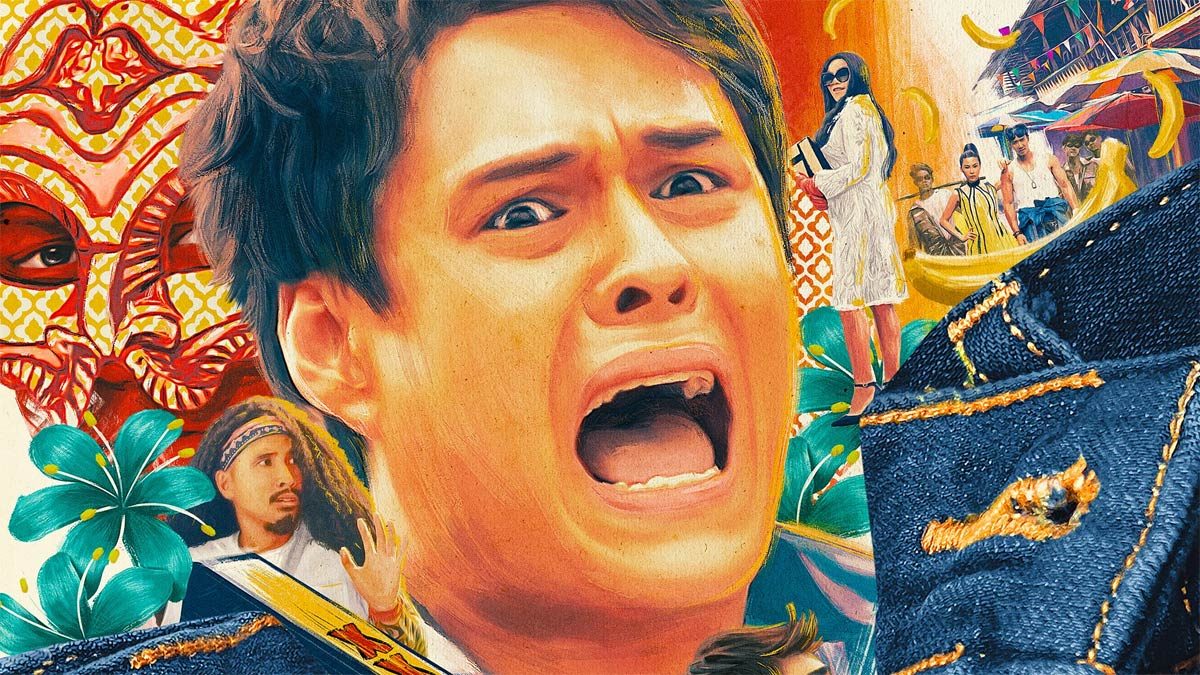SUMMARY
This is AI generated summarization, which may have errors. For context, always refer to the full article.

I just saw Victor Villanueva’s I Am Not Big Bird with my mom and younger brother. This experience in itself was, at best, awkward, but somehow this says more about what the Filipino moviegoing public typically expects of Pinoy comedy: as fun and family-friendly or squeaky-clean fare. Needless to say, even if my brother and I were well above the R-16 age restriction, I Am Not Big Bird is probably best enjoyed without your parents.
The action begins when Carps (short for Luis Carpio, played by heartthrob Enrique Gil), is dumped by his girlfriend. He seeks solace in the company of his best buds July and Macky who, unbeknownst to Carps, are already beginning to resent him for his absence and perceived selfishness. To make up for it, Carps offers his friends an all-expenses paid trip to Thailand, where he is enticed to “Cum, be the bigger man!” Little does the trio know that Carps, the best-looking of the bunch, also bears an uncanny resemblance to a well-endowed porn star named Big Bird.
With brief forays into the rudiments of the underground economy, sex tourism, and even extended subtitles about how we all lose to beauty standards that are set under patriarchy, the film packs campy acting, physical comedy, and bits of truly heartfelt bromance that almost allow you to forgive I Am Not Big Bird for its occasional resemblance to a Thai tourism ad.
Beneath the film’s silly surface however are the curious creative and artistic decisions that made such quirky career pivots for stars like Enrique Gil possible. While Big Bird was marketed as his comeback, the film also signals a hopeful sea change in the constricting roles, tropes, and toxic narratives that have been propagated for far too long in Philippine showbiz.
Enrique who?
Enrique Gil, by all definitions in the Philippine entertainment industry, is leading man material. It is however not hard to see that these are narrow definitions: wherein most leading men are granted the title by becoming romantic leads.
In Gil’s case, every starring role he held prior to Big Bird was opposite to actress Liza Soberano. Individually, they risk dissolving into an industrial goop of mestiza features, blow-dried hair, and wholesome pastels. To their fans however, Gil and Soberano are known as “LizQuen.” When seen together, audiences (and producers) get to project softly-lit fairy tale endings onto them, that can be packaged as easily digestible fantasy. LizQuen are just one example of the many, many love teams, produced under the rhetoric that it is one thing to be a cute individual, but to be two cute individuals who are in love? Imagine swooning at the wedding? Imagine the cute babies they could make!
Without their partners in their industry-made love teams, men like Gil are virtually unrecognizable. In a lineup with fellow Star Cinema powerhouses, James Reid and Daniel Padilla, he is yet another skinny mestizo with boyish features and a really effective scowl. Should they choose to fly solo, stars like Gil are equally cursed and blessed: cursed to be just another pretty boy, but also blessed to do whatever they want with name recognition gained as half of a love team.
So what does a project like Big Bird tell us about what’s next for stars like Gil?
Expect more critiques of Pinoy showbiz
Aside from attempts to sell Soberano as an ugly duckling or awkward frog, LizQuen’s earlier films also tried to convince audiences that Gil could act. Big Bird comes in as a refreshing spin by assuring us of the opposite, capitalizing instead on his total of three facial expressions. With that, the funniest thing about Big Bird is that, in what might be Gil’s most compelling role, he must do what he does best. He must act very badly, but this time, on purpose!
By casting Gil both as a Thai porn star and as his trademark lovelorn leading man, director Victor Villanueva shows how someone with particular assets – whether it’s a big bird or a face like Gil’s – not only has no need for acting chops, but is given few avenues when it comes to developing them. Villanueva, known for Patay Na Si Hesus (2016), uses his grasp of the absurd to show how actors are merely bodies to be milked for all their worth, whether they are cast in romantic comedies or in porn. This brilliantly touches on how certain capitalist industries – whether sex tourism, porn, or as mentioned earlier, love teams – exploit youth and beauty for profit.
Through the story of washed-up porn star Big Bird, Villanueva shows how fantasy is not only fleeting. It invests little while taking even more, while providing those who labor for its production with little room for agency. In other words, there is career growth without personal growth; hard work without necessarily sharpening skills. With Gil’s star at the forefront, Big Bird shines a light on the disposability of the pretty faces that have so long served as cash cows for showbiz.
Expect the elevation of the rom-com (and hopefully better portrayals of love)
Beyond exposing broader systemic issues of the entertainment industry, Gil’s departure from the love team industrial complex through I Am not Big Bird allows us to revisit pressing problems within the well-loved rom-com genre.
Judging from Gil’s/LizQuen’s filmography, we see how to play a male lead in a Filipino rom-com is to enact a Filipino female fantasy. However, isolating Gil’s/LizQuen’s filmography to make this point also shows how female fantasies, under our deeply patriarchal, deeply Catholic cultural conditioning are, to put it gently, all kinds of f**ked-up, with Gil/LizQuen having been coopted into the production of narratives that are deeply problematic.
In their films, much of what passes for courtship between LizQuen consists of a full-range of abusive behavior, predictably at Soberano’s expense. The most recognizable trope is that of what we’ll call the “Changed Man,” or the jerk who comes around after meeting “the (chosen) one.” In Just the Way You Are (2015), a spin on the teen classic She’s All That (1999), Soberano plays a “homely transfer student.” Gil is introduced in a scene cribbed almost entirely from Magic Mike, so the rest of the film is spent assuring us that he is not a stripper, until the two meet when he accidentally exposes his junk to her in a shared bathroom.
Even after this incident, Soberano remains a stranger to him. Because he barely talks to her, choosing instead to win favor among her friends, he is easily pranked into publicly declaring his love for her while in full costume – which she understandably rejects. He then responds by baiting her into a date with him, by leaving a trail of rose petals towards towards a candlelit dinner under a tent in some unnamed grassy location. Eventually and inexplicably, they trade I love yous and get together, cue theme song, the end.
In Everyday I Love You (2015), Gil plays a city-dwelling production assistant banished to Bacolod, where he must prove himself worthy of a promotion in the cutthroat world of lifestyle TV. There, he sees Soberano, minding her own business while filming a video diary for her comatose boyfriend (played by Gerald Anderson). When she pans left, accidentally getting a shot of Gil ogling her, he takes it as a cue to film her back on his phone. Much of the conflict consists of Soberano trying to convince Gil to delete the videos of her that he shot without her consent, and Gil giving Soberano new conditions under which he will delete the videos…which were shot without her consent. Eventually, she falls for him (because of course she does).
The films are full of “love bombing,” or unwelcome grand gestures. While such acts are now collectively recognized as forms of manipulation, they are still shown in local productions as classic examples of kilig or romantic fare. Why talk to a fellow human being and acknowledge their agency when you can simply arrange a massive production for public viewing of your love? After all, what good is love and romance when not performed for an audience?
There’s also stalking, which only exposes the anorexic line between romance and horror in the Filipino entertainment landscape, but on a more serious note exposes the shoddy definition rom-com audiences have of consent. For so many of the male leads in these films, “no” often means “yes.” However, granted that the rom-com and rom-drama audience is overwhelmingly female, the disturbing conclusion is that for the female consumer, the word “no” is not meant to be respected. Romance is marked by a relentless violation of boundaries, portaying women as conquests and defining love as a game.
Conclusion: Becoming the bigger man
While the exception to this could have been Antoinette Jadaone’s Alone/Together (2019), it serves as the exception rather than the rule, coming off as too-little-too-late amidst the relentless toxicity of the earlier examples of Gil’s work.
And yet, even if these examples are enough to prove that the love team industrial complex is by and large a disservice to women (by showing them as obsessive and codependent) these are failures that can be forgiven for their systemic nature. For the most part, these really are just caricatures of cultural and political-economic conditions in which women need men (or rather, women need heterosexual relationships) to prove their worth. Their survival under capitalist patriarchy depends on it.
Men in Filipino romantic comedies, on the other hand, are often portrayed offensively for no real reason. My Ex and Whys (2017), or the source of Soberano’s “Pangit ba ako? (Am I ugly?)” meme, brushes off the abhorrent behavior of all its male characters (in this case, Gil’s family of lying, cheating womanizers) with the explanation that “boys will be boys.” In his (and his screenwriters’) attempts to package himself as the exception to this, Gil ends up coming off as the very embodiment of the #notallmen hashtag.
With the removal of the tired love team trope from the plot, Big Bird allows its viewers to ponder the more challenging proposition of the male romantic conquest, showing richer relationships among real men (for this, Gil’s co-stars Red Ollero, Nikko Natividad, and Pepe Herrera deserve much credit). That Big Bird is also a film about porn stars, thugs, and all kinds of unsavory workers in the underground economy only further exposes the shortcomings of how Filipino men are portrayed in romantic comedies. By looking at love among its male leads, it portrays men in ways that are far more nuanced and far more human than any of the men in Gil’s earlier films. It shows men not as partners in crime or wingmen tag-teaming on the manipulation of a romantic conquest – it centers friendship, and that in itself can be seen as romance. While I Am Not Big Bird falters across some departments, the film does deliver on its promise to make Gil “the bigger man.” – Rappler.com
Add a comment
How does this make you feel?










There are no comments yet. Add your comment to start the conversation.